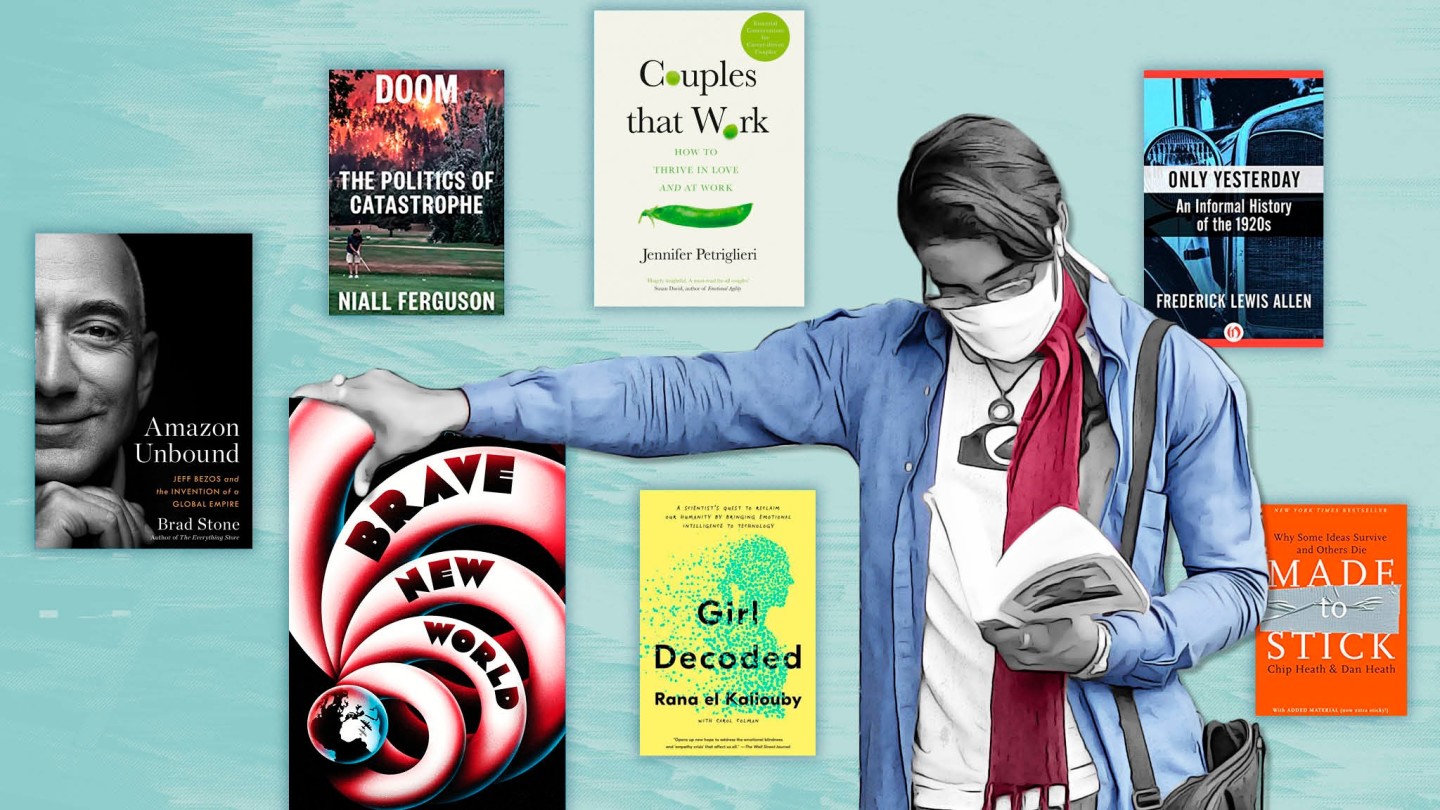A reading list to prepare for a post-pandemic age

Roula Khalaf, Editor of the FT, selects her favourite stories in this weekly newsletter.
It is too soon to say we have entered a post-Covid world, but it is never too soon to prepare for the future. So to celebrate the launch of this year’s Financial Times and McKinsey Business Book of the Year Award, we asked longlisted, shortlisted and winning authors to choose a book to add to a post-pandemic reading list.
Last year’s winner, Sarah Frier, author of No Filter, selected a book that could be in the running this year. Her choice is Amazon Unbound (published next month), by Brad Stone, who won the book award himself in 2013 with his last book on the ecommerce and technology group, The Everything Store.
“Covid only increased our dependence on technology companies, Amazon chief among them,” Frier wrote. “Brad’s book is essential to understanding the company’s pursuit of dominance, sometimes at a high societal cost.”
Sebastian Mallaby, author of The Man Who Knew (winner, 2016), More Money Than God (shortlist, 2010), and the forthcoming The Power Law, a history of venture capital, also went for a 2021 title — Niall Ferguson’s Doom: The Politics of Catastrophe (published next month): “We are all trying to gain perspective on Covid, and Ferguson frames the tragedy in the broadest and most bracing way, drawing on humanity’s experience of all kinds of disaster, from the bubonic plague to the first world war. Sweeping in its narrative and multidisciplinary in its approach, Doom proves you can write an engaging book about a repellent subject.”
Erin Meyer, co-author with Netflix co-founder Reed Hastings of No Rules Rules (shortlist, 2020), recommended Made to Stick (2007), Dan and Chip Heath’s “entertaining, practical guide to communication”, and Couples that Work (2019), by Insead colleague Jennifer Petriglieri.
Of the latter, she wrote: “Last summer, while in the US, I had dinner with a realtor friend. Despite the economic hardship brought on by the pandemic the housing market in Minnesota is apparently roaring. The big thing everyone is looking for? Walls. Lots of walls. ‘Up until the pandemic hit’, he explained, ‘open floor plans were the rage. But now that everyone is stuck at home, mostly we all just want to be separated’. I couldn’t help wondering, instead of buying a new house to avoid seeing one another, maybe we should work on our relationships?”
She added: “Couples that Work outlines the lessons from a fascinating study [Petriglieri] conducted on dual-career couples. If you’ve found that you and your spouse have had to renegotiate your relationship now that you are all stuck at home this book will show you how.”
Other authors suggested seeking advice from history.
Jeremy Heimans and Henry Timms, authors of New Power (shortlist, 2018), picked Mary Parker Follett’s The New State (1918): “Written as the world emerged from the ruins of the first world war, the often-overlooked early management theorist reimagined democracy and group organisation for a new world. She argued that representative government wasn’t delivering enough for people and democracy itself would be in peril unless it became more participatory, more deliberative, more locally relevant and able to muster a new kind of ‘collective will’. At another fragile moment for democracy and trust in institutions her thinking feels hugely relevant to how we imagine organisations in a restless and sceptical post-Covid world.”
Sheena Iyengar, author of The Art of Choosing (shortlist, 2010), also went to history for her choice, Only Yesterday (1931), Frederick Lewis Allen’s informal history of the 1920s: “There is much to enjoy in this wonderfully written book, which chronicles another turbulent decade, much like our own, after the 1918 flu pandemic. With wit and panache, the author, a former editor of Harper’s Magazine, describes business and other topics in a way that seems relatable and relevant, even almost 100 years later.”
Raghuram Rajan, winner in 2010 for Fault Lines, and shortlisted in 2019 for The Third Pillar, suggested Titan: The Life of John D. Rockefeller, Sr. (1998) by Ron Chernow: “In these days of great angst about the free market, I recommend this captivating biography of an archetypical capitalist, who built a storied fortune on hard work, careful business sense, coupled with dollops of bribery, active monopolisation of business, and rank thuggery. Before we condemn him, it is useful to remember that he also spent the latter half of his life giving away his money, endowing both Rockefeller University and the University of Chicago, institutions that have contributed significantly to human progress.”
Duncan Clark, whose Alibaba was shortlisted in 2016, picked The Great Reversal: How America Gave Up on Free Markets (2019), by Thomas Philippon, which he called an “excellent and timely analysis of how ‘regulatory capture’ has driven up costs for many consumers in the US across multiple sectors of the economy, undermining competitiveness. Can America get back on track?”
Amy Webb, The Big Nine (longlist, 2019), suggested three additions to our post-Covid list: Girl Decoded (2020) by Rana el Kaliouby, “makes a strong case for why we must make AI systems more equitable, diverse and human”; Jared Diamond’s Collapse (2004) “asks whether our use and abuse of the environment led to societal collapses throughout history”.
But her number one choice was an unsettling one: Aldous Huxley’s dystopian novel Brave New World (1932).
“Covid resulted in the acceptance and rapid deployment of mRNA, a groundbreaking advancement in an emerging field called synthetic biology, which aims to rewire living organisms and program them with improved or new functions,” she writes. “If you re-read this as a business book about the future of biotech, you will inevitably find yourself asking new questions: what assumptions must hold true for our current strategy to succeed? What parts of our business make us a target for disruption? What happens to our business model if life expectancy is extended 30 years? How could the future of the workforce look very different than it does today?”
A few titles to help handle the challenges of the post-Covid era
What to Do with Your Money When Crisis Hits: A Survival Guide, by Michelle Singletary (May)
US personal finance columnist Singletary shares her expert advice for weathering a financial storm, from pandemics to recessions, bear markets to energy crises.
Remote Work: Redesign Processes, Practices and Strategies to Engage a Remote Workforce, by Chris Dyer and Kim Shepherd (May)
Guidance on how to build a successful remote working strategy that engages employees, allows them to perform to their full potential, and improves business performance.
The Changing World Order: Why Nations Succeed and Fail, by Ray Dalio (August)
Investor Dalio examines history’s most turbulent economic and political periods to reveal why the times ahead are likely to be radically different from our lifetimes.
The Business of Race: How to Create and Sustain an Antiracist Workplace — And Why it’s Actually Good for Business, by Margaret Greenberg and Gina Greenlee (August)
A guide to ways businesses large and small can make positive, sustainable changes to bring more racial diversity, inclusion and equity to the workplace.
The Raging 2020s: Companies, Countries, People — and the Fight for Our Future, by Alec Ross (September)
Former Obama adviser Ross proposes a new social contract to restore the balance of power between government, citizens, and business.
To read more about the Business Book of the Year Award, please visit www.ft.com/bookaward
Share your views — and your book choices — in the comments section below

Comments